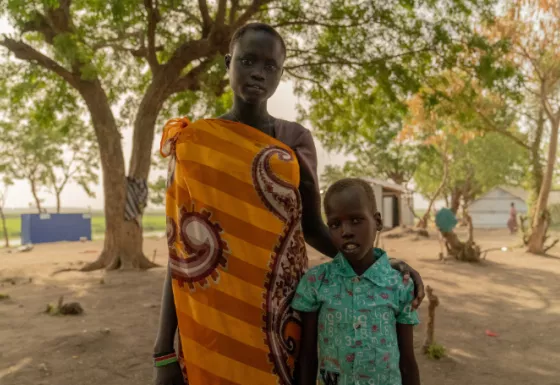Nyamach lives on the first floor of a derelict building in Malakal, South Sudan. She is raising her brother Deng Ruot Phar and seven other siblings after fleeing the war in Sudan.
Nyamach said, “Everyone assumes that I was born in Sudan, but I’m actually from South Sudan. In 2016, when the fighting started in Juba, I fled with my family to Ethiopia. Then, we moved to Sudan. When the war started there, we were living in the north. Now, we are back in South Sudan.
We were really scared when the war started in Sudan. We saw destruction and violence all around. We experienced a lot of emotions together: fear, anger. We had to overcome many challenges every day just to survive.
The journey was really difficult. I was responsible for Deng Ruot Phar as well as my other brothers and sisters. At some points, we were separated, and all I felt was dread.
We had no money for food, but a kind woman we met on the road gave us some money – some South Sudanese pounds. It was very little, but it helped us survive at that moment. I bought some bread, and we were able to eat for a couple of days.
Living in Malakal is about surviving – it is very difficult. I have nothing to do and no one to help me. Sometimes, other kind people see that we are struggling and going through hardship, so they help us in whatever way they can. They give me something that can help us survive the day. Then the next day comes. Too many nights, we go to bed hungry.
Of course, my brother needs food, water – the basics for survival. But he also needs to go to school. Not going to school affects him emotionally. He sees many others his age going off to school, and he asks me: ‘Why can’t I go too?’ I have no answer for him. There’s no way he can."

“Maybe we can move into the village here or move on to Juba or somewhere else. But right now, we do not have the means. I want to find our relatives; maybe they are here too. I have no idea if they are still alive.
Our father remained in Ethiopia. Our mother passed away, but she had abandoned us several years before her death. She got married to another man – that’s why she abandoned us. In our culture, when a woman marries another man, she has to leave her first children behind. It still hurts.
The word ‘home’ brings up a lot of difficult emotions. Home right now is pretty terrible. I’m not able to provide for my brother; I’m not properly married – I was forced to marry a man, but I didn’t want to. Home is supposed to be a place where I cook good food and have all my family around me.
When I think of home, the first thing that comes into my head is my mother – together in the house with me when I was very young. I miss her a lot. In a way, I think of myself because I am playing the role my mother once played”
War Child has provided Nyamach and her siblings with emergency cash assistance to help them meet their basic needs - food and water.
I am very grateful for the support provided by War Child, but we are still in a very tough situation.
War Child Protection Officer Amos said, “Nyamach and her siblings were identified by War Child as in need of urgent support due to being unaccompanied. Through case management, they received cash to support their basic needs. Once we identify such cases, we usually provide long-term case management and psychological support. But the circumstances here are really difficult. Most people are just passing through. We hope they will move into the community to access further support.”
